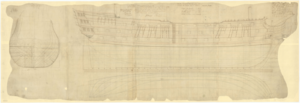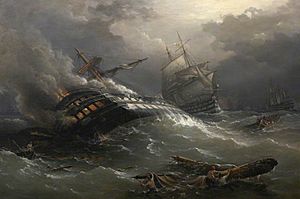HMS Prince (1788) facts for kids

Prince
|
|
Quick facts for kids History |
|
|---|---|
| Name | HMS Prince |
| Ordered | 9 December 1779 |
| Builder | Woolwich Dockyard |
| Laid down | 1 January 1782 |
| Launched | 4 July 1788 |
| Fate | Broken up, 1837 |
| Notes |
|
| General characteristics | |
| Class and type | London-class ship of the line |
| Tons burthen | 1871 |
| Length | 177 ft 6 in (54.10 m) (gundeck) |
| Beam | 49 ft (15 m) |
| Depth of hold | 21 ft (6.4 m) |
| Propulsion | Sails |
| Sail plan | Full-rigged ship |
| Armament |
|
HMS Prince was a large warship of the Royal Navy. She was a 98-gun second rate ship of the line. This means she was a powerful sailing ship with many cannons.
Prince was launched on July 4, 1788, at Woolwich Dockyard. She is famous for her role in the Battle of Trafalgar.
Contents
Life at Sea for HMS Prince
Prince did not see much fighting during her time. She was known for being quite slow. One captain even said she sailed "like a haystack."
In 1794, when war started with France, Prince was not immediately used. She stayed in Portsmouth harbor. Her hull was made longer in 1796 to improve her design.
The Battle of Trafalgar
By 1805, Prince was part of the Channel Fleet. Her captain was Richard Grindall. At the Battle of Trafalgar in October 1805, Prince was very slow to join the fight.
She took over two hours to travel just a few miles. By the time she arrived, most of the enemy ships were already captured or had run away. This left few targets for Prince's powerful cannons.
Prince's Role in the Battle
Prince did fire at the Spanish flagship Principe de Asturias. She also fired at the French ship Achille. Prince was not attacked herself and suffered no damage. She also had no crew members injured.
While Prince was firing, Achille's top part caught fire. The next cannon shots brought down her burning main mast. This caused the entire ship to be covered in flames.

Rescue Efforts After the Battle
Captain Grindall saw that Achille was doomed. He stopped firing and moved Prince closer. He then sent out boats to rescue French sailors. Many were from Achille and other ships.
This rescue was dangerous. Achille's cannons, left loaded, fired by themselves due to the intense heat. The ship exploded at 5:45 pm. Only about 100 men had been rescued from Achille by then.
Despite the danger, Prince and other British ships saved hundreds of sailors from the water.
Helping After the Storm
A week of terrible storms followed the battle. The strong Prince became very important. She gave supplies to ships that were badly damaged. She also towed ships that needed help.
Prince saved many sailors from other damaged ships. She and other undamaged British ships helped prevent many other ships from sinking. At one point, Prince saved 350 men from the sinking Spanish ship Santíssima Trinidad. These men would have drowned otherwise.
Prince took the rescued sailors to Gibraltar. When she arrived, she was ready to sail again in just a few hours. This showed how strong and reliable she was.
Later Years and Fate
After the war, Prince stayed in Portsmouth. She was eventually taken out of service. Prince was broken up in 1837.
 | Misty Copeland |
 | Raven Wilkinson |
 | Debra Austin |
 | Aesha Ash |

